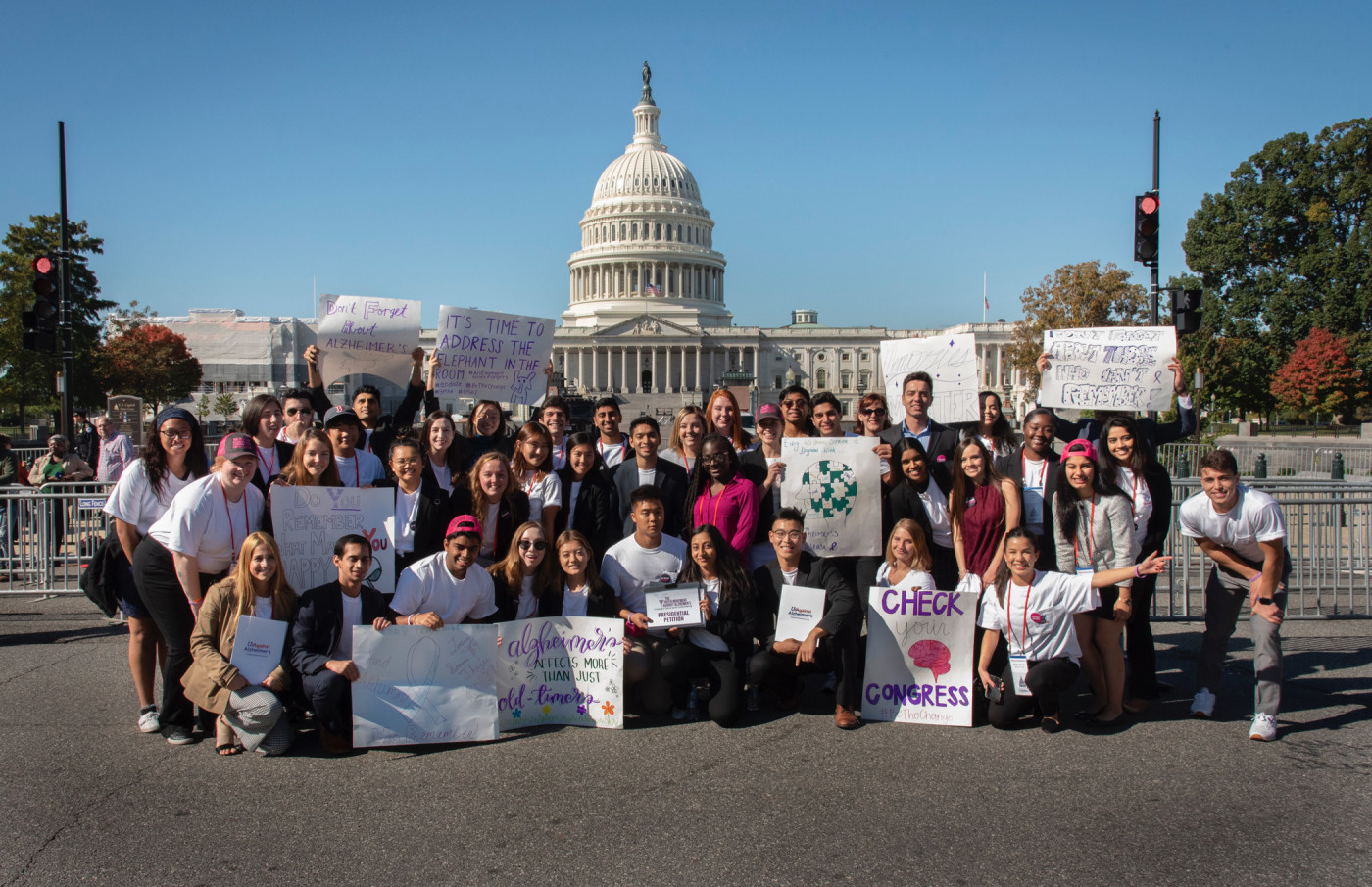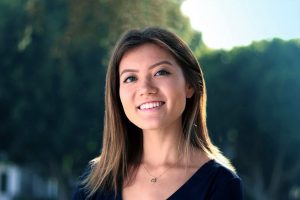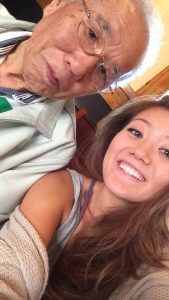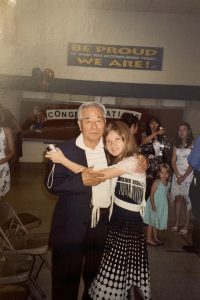Movement Gets Youth Involved in Alzheimer’s Advocacy, Education

Students from the Youth Movement Against Alzheimer's visit the U.S. Capitol. (Photo courtesy of Katherine Rose)
Alzheimer’s disease is not often seen among those younger than 65, but the Youth Movement Against Alzheimer’s is getting young people involved with the neurological disorder through volunteer work, education, and advocacy.
While they aren’t typically affected themselves, young people often are left caring for a family member with the disease. They’re also indirectly burdened by the economic cost of Alzheimer’s — which is estimated to jump from $215 billion to upward of $500 billion annually by 2040, according to the Centers for Disease Control and Prevention.
“Everyone thinks Alzheimer’s is an old person’s disease, and you don’t have to think about it until you’re older,” Katherine Rose, 26, CEO of the Youth Movement Against Alzheimer’s, said in a phone interview with Alzheimer’s News Today. “But we’ve realized that that’s just simply not true.”
The goal of the Los Angeles-based nonprofit is to bring younger people into the disease community through volunteer opportunities that assist those living with Alzheimer’s and dementia. In its intergenerational YouthCare program, the organization taps graduate gerontology students to meet with dementia patients and do brain health exercises with them.
The organization’s 42 chapters, across 13 states and the District of Columbia, both on high school and college campuses, focus on learning about Alzheimer’s, helping dementia patients in their own neighborhoods, and taking steps to lower the risk of developing the disease later in life.
‘It affects everyone’
Rose was one of the first members of the organization and had a personal connection to dementia, which her grandfather, Hae-il Yoon, was diagnosed with five years ago. He died this past summer at the age of 92.
“We met people who had to take breaks from school, because they had to work and support their families because their parents couldn’t work as much anymore, because they were taking care of a loved one with Alzheimer’s,” Rose said. “And so we started to understand the gravity of the advocacy we were doing and building this supportive community for young people.”
People who aren’t directly affected by Alzheimer’s also play integral roles in the organization. The newest member of the board of directors is 20-year-old Suyeun (Susie) Choi, a junior studying neurobiology at the University of California San Diego. She got her start volunteering at the University of California Los Angeles Longevity Center in high school.
“It affects more than just old-timers. It affects everyone because whether it be their family or financially impacting the country, this is a very urgent and important matter,” Choi said.
The Youth Movement Against Alzheimer’s has roots as far back as 2005, when the Undergraduate Gerontology and Alzheimer’s Disease Awareness Association (UGADA), the precursor to the current group, was founded. UGADA received its 501(c)(3) status, designating it as a nonprofit, in 2009. Nihal Satyadev, the former CEO and co-founder — who was an undergraduate at UCLA at the time — re-launched the organization in 2015 under the name used today. According to Rose, the Youth Movement Against Alzheimer’s is now the nation’s largest youth-led nonprofit raising education and awareness of the disease.
The power of memory
It was Rose’s grandfather who helped inspire her to get involved with the organization at UCLA. Yoon had been like a second father to Rose while she was growing up. Rose’s father worked in computer forensics for the U.S. Army, and her mother would put in long hours at a nearby beauty supply store in the Baltimore suburb of Severn, Maryland. So it was up to Rose’s grandparents to help raise her and her older brother. The duo whisked their grandchildren between piano lessons, Taekwondo, tennis matches, and French language classes.
“He was the one who would always pick me up and clean my cuts and scrapes when I would fall off my bike,” Rose said. “He just definitely was the one who was around to pick up the pieces.”
So it was all the more difficult when, years later, Rose would call home from UCLA and feel like she was talking to a completely different person. Her memories were intact, but all of his seemed out of reach.
“My grandpa was having a hard time understanding who I was and why I was talking to him,” Rose said. “And so that was affecting me a lot.”
Drawing from this experience, she quickly jumped on board with the Youth Movement Against Alzheimer’s when it was first starting at UCLA. She first served as the secretary of the national operating board, then director of national relations, and when Satyadev stepped down as CEO to go to medical school, she was there to take the reins.
Connecting young and old
YouthCare came out of a pitch at the Social Entrepreneurship Academy at UCLA. Current students and private sector entrepreneurs are matched with organizations to pitch a business venture to angel investors who will fund them.
In 2017, as part of the pitch competition, the nonprofit’s team won $10,000 toward starting a program that would help older people with dementia work on their brain health and connect to a younger generation. It was based on exercises first done at the UCLA Longevity Center’s “brain bootcamp,” which teaches patients how memory works, strategies to improve memorization, and developing good brain health habits.
Rose had expected to launch the program on March 9 last year, but then COVID-19 hit the U.S. The team was able to rework the program virtually through the Zoom platform and had 20 families paired with graduate students from the University of Southern California Leonard Davis School of Gerontology in the first iteration of YouthCare. The program runs for eight weeks, and the student-patient duo — actually a ratio of two students to one family — meet twice a week for up to an hour. Students also speak with caregivers for 30 minutes, though it often ends up being an hour, Rose said.
Between YouthCare and the organization’s partnership with TimeOut@UCLA, which allows older generations to meet and mentor UCLA students, it has provided more than 6,000 hours of respite care.
Starting Young
In addition to advising the organization on new initiatives and next steps, Rose sees adding young board members like Choi as a priority. It’s a way to help students learn and grow as professionals, which is critical to the purpose of the Youth Movement Against Alzheimer’s, she said.
“We’re creating a community of capable and engaged students who are willing to take initiative and fight for the things that they care about,” Rose said.
Choi will remain president of the UCSD chapter, but hopes to pursue a doctor of medicine and of philosophy — known as an MD-PhD — while researching brain diseases like Alzheimer’s. Meanwhile, she’ll continue to advocate on behalf of the Youth Movement Against Alzheimer’s. One of her latest ideas was to expand the organization’s social media presence, especially on TikTok, a video platform popular with younger people.
Education for brain health also needs to start young, according to Rose. Symptoms of Alzheimer’s and dementia can develop 10–20 years after physical changes happen in the brain. Early intervention can pay huge dividends in the future, she said, noting that things like diversifying daily activities, eating right, and getting exercise now all make a difference later on in life.
“We really need to start focusing on this now. Brain health is important,” Rose said. “And people need to know it now.”
Rose worries that not enough people are going into gerontology and aging services, a fear that could be allayed through educating young people about neuroscience and the career tracks open to them. Three years ago, the organization brought 25 chapter leaders to Capitol Hill to learn more about Alzheimer’s advocacy, and they doubled the number of students attending the next year.
While most chapters and education initiatives are focused around young people in high school and college, Rose thinks it’s never too early to teach someone how they can help alleviate the stress Alzheimer’s places on society and how people can protect their brain health as much as possible.
“We’re already doing it in colleges and high schools, why not middle schools? Why not elementary schools?” Rose said. “Why don’t we teach this stuff from a really young age?”
In 40 years when Alzheimer’s cases are expected to soar past 14 million in the U.S., today’s young adults and children are going to have to be the ones solving the problem. The Youth Movement Against Alzheimer’s is preparing them early to tackle the challenges head-on.









